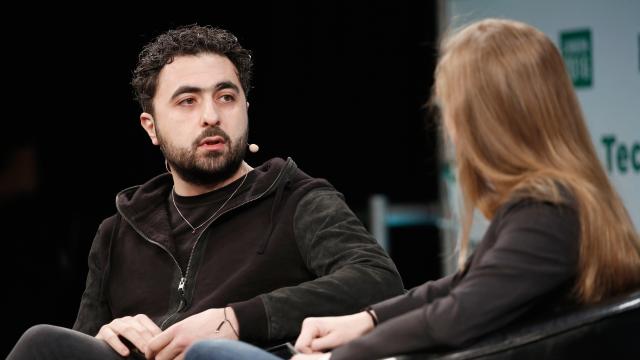With artificial intelligence hype leaving venture capitalist firms foaming at the mouth, ready to buy into any new company that sticks an “A” and “I” in its name, we sure as hell need a new way of defining what constitutes an AI. The Turing Test fails to define real intelligence in today’s world of large language models. One leading figure in the AI field has a better idea that could only come from the wealth-obsessed realm of big tech: the best way to tell if AI is smart is if it can get rich quick.
Mustafa Suleyman, a major AI developer who previously co-founded DeepMind — now owned by Google — has an upcoming book where he reportedly discusses judging an AI’s smarts based on its ability to stack cash. According to a Bloomberg report, in The Coming Wave: Technology, Power, and the Twenty-first Century’s Greatest Dilemma, Suleyman argues that AI research needs to focus on short-term developments, rather than pipe dreams like a supposed artificial general intelligence, or AGI. What’s a good example? His “modern Turing Test” would give an AI $US100,000, and then the researchers would wait for the AI to make $US1 million on its initial investment. See, only a true intelligence can “make line go up” and people who are good at making line go up are clearly the smartest people.
The AI developer called this measure of understanding artificial smarts “artificial capable intelligence,” and like any good capitalist, AI should be judged on its financial accomplishments rather than its capacity for human-level interaction. So how would the AI make bank? Essentially, it would have to complete your average business degree term project. The AI would research e-commerce business opportunities, create an idea for a product, then figure out the process for both manufacturing and selling the service.
The proposal sounds more like an AI-based get-rich-quick scheme you would find on the seedier ends of YouTube and TikTok financial influencers. AI is certainly more capable of designing products than having true imagination, but modern systems are still far from giving Suleyman a flush bank account. There are several AI agents floating around that had their time in the AI spotlight earlier this year. They essentially act as multiple versions of a chatbot working in concert to complete specific tasks. Users have even made agents that could perform tasks like ordering a pizza over the phone.
A program like Auto-GPT could, in theory, craft a business plan for a new product, though today’s large language models certainly don’t have the power to dream up a new product that people actually want and follow through with any accuracy. The AI is inherently iterative, and it does not actually comprehend its generated content in any real-life context. Its output is inherently based on its training data, so any kind of “novel” innovation it creates is going to be born of existing examples that best fulfil the original prompt.
AI evangelists often squawk that all human creations are inherently iterative, but unlike AI, mankind’s creations come from the comprehension of basic human needs, or at least the simple sense of empathy. Sure, an AI can create a product, and perhaps that product would even sell. But would it be a good product? Would it actually help people? If the end goal is “make me a million dollars,” does that even matter?
What kind of empathy do we need from AI?
Suleyman used to lead AI development at DeepMind though he is now the CEO and founder of startup Inflection AI. The company’s leading chatbot Pi is a very capable AI that tries to come off as empathetic. It’s also far more restrictive than other chatbots like ChatGPT. It cannot research information on the internet, it can’t generate code, and it constantly emphasises that it’s no replacement for a real-life therapist or even a human companion.
When I last spoke to Suleyman, he said the narrowly-defined capabilities of his company’s AI are the biggest selling point for the chatbot. He was adamant that his development team didn’t want something that could “maximise engagement” to the detriment of users.
To be charitable, the DeepMind alum may only be considering this test as an example, but if so, why is AI making money the first thing on his mind? Big tech companies, from Google to Microsoft to OpenAI, are all too busy competing to sell users AI products that none are honestly taking the time to consider the risks or implications of their systems. Company execs have scoffed at requests by the wider research community to slow down development, as they have so far proved their first priority is to shareholders, not society at large.
In talks, Suleyman has said those whose jobs are displaced by AI need “compensation” from world governments. In that way, why can’t we have an inkling of consideration from the tech companies proliferating these AI models?
In this day and age where chatbots have become so sophisticated they can replicate human speech, the AI can easily appear intelligent while being unable to comprehend any of what it says. Despite what some doomsayers and folks like OpenAI leadership Sam Altman and Greg Brockman have proclaimed, we’re nowhere near the level of AGI.
AI has progressed far, but in many ways, it still falls short of the capabilities that early computer scientists envisioned. Natural language has long been the goal for these “Turing-type computing machines.” But machines that actually “think” as humans can is still out of our grasp, and there’s still an open debate if a computer could ever gain real “intelligence” as humans understand it. On the flip side, you had former Google employee Blake Lemoine claiming the company’s chatbot model was actually intelligent because it sounded human. Boiling intelligence down to a binary ability to rake in cash would be even less helpful than imagining the AI is your friend just because it says it is.
